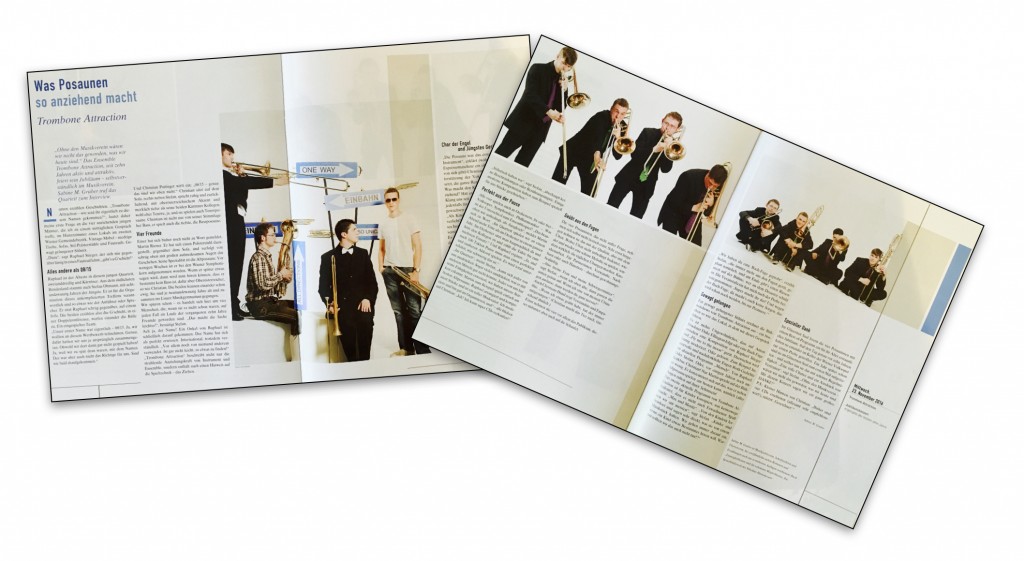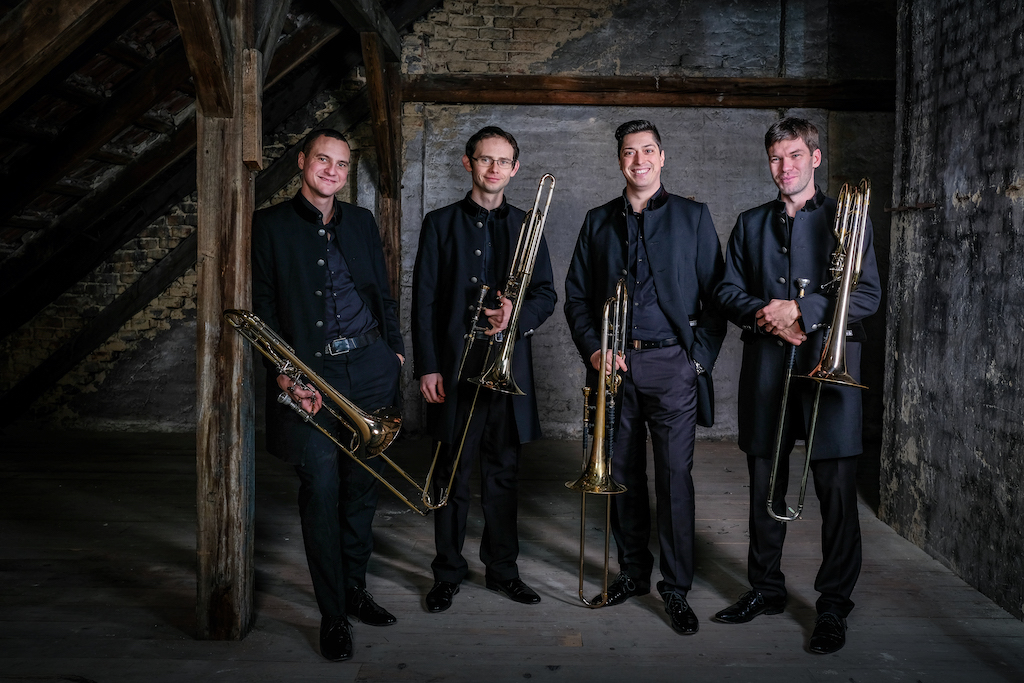Sabine M. Gruber met the trombone quartet Trombone Attraction for an interview celebrating their 10th anniversary.
"Without the Musikverein, we wouldn't have become what we are today." The Ensemble Trombone Attraction, active and attractive for more than ten years, celebrated its anniversary - naturally at the Vienna Musikverein.

Names tell stories. "Trombone Attraction - how did you actually come up with this name?" is therefore my first question to the four attractive young men I meet for a lunchtime conversation in the back room of a restaurant in Vienna's second district. Vintage furniture - low tables, sofas, stylish upholstered chairs and armchairs. A daring mix of styles. "Plus", says Raphael Stieger, who casually leans into an armchair opposite me, "there's a G'schicht!"
Anything other than 08/15
Raphael is the oldest in this young quartet, thirty-two and Carinthian. Stefan Obmann also comes from the southernmost province of Austria, the youngest at twenty-eight. He is responsible for the organisation of this uncomplicated meeting and is something of a leader or spokesman. He sits diagonally opposite Raphael, on a sofa. So the two of them tell the story, in a double conference, throwing the balls to each other. A well-rehearsed team. "Our first name was actually - 08/15. That's why we originally teamed up. even though we didn't play there. Yes, because we were too late with the name. But that was not the right one for us either. "We'll figure it out soon." And Christian Poitinger throws in: "08/15 - that's just not who we are." Christian sits on the sofa, right next to Stefan, speaks calmly and restrainedly, with an Upper Austrian accent and noticeably lower than his two Carinthian colleagues, more likely tenors, yes, and they also play tenor trombone. Christian is not only bass in his voice, he also plays the deepest, the bass trombone.
Four friends
One has not yet spoken, Martin Riener. He has placed an upholstered chair opposite the sofa, and is watching the action from above with large, attentive eyes. His speciality is the alto trombone. A few weeks ago he was recorded by the Vienna Symphony Orchestra. When he will say something later, you will be able to hear that he is certainly not a bass, but an Upper Austrian, just like Christian. The two have known each other for ages. They are each twenty-nine years old and went to the Linz music high school together. We can already sense - these are four people who, if they haven't already been, have definitely become friends over the last ten years. "That makes things easier," confirms Stefan. Oh yes, the name! One of Stefan's uncles finally came up with it. The name turned out to be perfect. International, yet understandable. "Above all, it hasn't been used by anyone else. It's not easy to find something like that!" "Trombone Attraction" not only describes the radiant attraction of instrument and ensemble, but also contains a reference to the playing technique.
Choir of Angels and Last Judgement
"The trombone was the first chromatic playable brass instrument", explains (while in the background the espresso machine makes a deafening noise) Christian, "that's why it was used to support the vocal parts colla parte, throughout Renaissance literature". What makes the sound of the trombone so extremely attractive? Does it not also have to do with the fact that the sound has been familiar to us since childhood? In any case, it could apply to all those who grew up in the country... "As a child I simply fell in love with this sound," says Christian, "and that's why I chose this instrument. I couldn't imagine any other." It's true: In the brass band the trombone accompanies us practically from the cradle to the grave. Its sound reminds us of baptisms, confirmations, weddings, festive services, Christmas, military parades, round birthdays and funerals. The trumpet stands for the choir of angels as well as for the Last Judgement. Simply everything is stored in its sound and is awakened when we hear it, our whole range of feelings from happy, moved, happy, solemn, thoughtful or deathly sad. The trombone sound, however, has not only something classical and something rustic, but also something casual about it, because the instrument plays an important role in jazz. Last but not least the trombone is also popular in contemporary music. In the sound of the trombone you can feel the tremendous potential energy at every note, which is loudly and radiantly discharged in a romantic symphony, restrained in a baroque fugue in precise colored dots, swinging relaxed in jazz, infinitely dynamically increasing at any time and gliding from one note to another. "Stylistically we have", says Stefan, "no limitations or fear of contact at all. Some modern composers, for example, have written pieces especially for us".
Perfect from the break
All four also play in orchestras, fixed or free - Volksoper, Symphony, Philharmonic... What is the difference to ensemble playing? "We absolutely need that, as compensation," Martin says. "In a quartet we play more notes in one evening than in an orchestra in a whole year. In the orchestra you mainly sit there, listen to your colleagues and count the bars until the next performance." And Raphael adds: "Yes, and after 100 bars of pause you have to play a perfect and clean chord. It's totally underestimated how difficult it is." "In the quartet," says Stefan, "each of us can express ourselves. Even express a lot of things that he couldn't express with other means. Each of us has expanded our abilities, we have recognized our strengths. Martin, for example, simply plays the alto trombone best. Raphael arranges and composes pieces and is a great presenter. I moderate and I'm good at organizing, and" - everyone looks at Christian: "Me? I can sell CDs great!"
The Art of the Fugue
There is no question that the four trombonists do not take themselves very seriously. But they do take the quality, that is, the practice, very seriously. Where practicing does not necessarily mean playing a beautiful melody over and over again, but really: doing the daily exercises. Hard work. For partners, relatives, neighbours or even pets - it takes getting used to. "So my wife and my mother-in-law," says Stefan, "when I practice upstairs, they pay close attention downstairs. If I skip one of my exercises, they get all nervous!" Christian's dog also shows understanding and empathy. "Whenever I practiced, he would always sing along." (Christian imitates the animal, deceptively similar.) The four of them take the audience seriously, especially the audience, but sometimes also the audience on the shovel. "We rehearsed a Bach fugue there", Stefan tells us, "which gets more and more out of control, planned of course, and at the end there is a huge argument on stage about who is to blame for the disaster. The organizer took me aside after the rehearsal: "You're doing great! And about the Bach fugue, don't worry, it'll be fine until the premiere.
Risky success
A daring mix of styles characterizes the stage shows of Trombone Attraction - a bit like the venue where we are having this conversation. It is nothing unusual for Anton Bruckner to be followed by Duke Ellington or for a Bach fugue to come between a composition by Raphael Stieger and "Fly me to the moon". In between, the moderation is whimsical. Or read. For example, humorous and thoughtful Eugen Roth poems in the current programme "Mensch". By Raphael. Or Stefan. Or, some years ago still unthinkable: Christian! Only Martin speaks little on stage. He concentrates on what he does best, apart from playing the alto trombone, namely (all eyes rest on him): Being beautiful! The second current programme of Trombone Attraction is designed for children, which by no means means means that it is not fun for adults too: "Max and Moritz". "We learn most from the children," says Stefan. "Children are tough as nails and say very directly what they think of a piece of music. We always respond when a child wants to hear something specific. Why shouldn't we do that either!?"
Special thanks
The four trombonists are celebrating an anniversary that is astonishing for their age with a best-of programme at the Wiener Musikverein: ten years ago to the day they met for their first rehearsal in the cellar of the Vienna Volksoper. A year later they performed for the first time in the Glass Hall - and since then they have been doing so with great regularity. "A great opportunity and an expression of trust," says Stefan. "Without the Musikverein, we would not have become what we are today. With this concert we say a very big: THANK YOU!" P.S.: A little note from Christian: "Three CDs have been released so far. All very recommendable!"
Sabine M. Gruber is a music journalist, writer and translator. In addition to novels and short stories, she has published the book "Unmöglichkeiten und die schönsten Möglichkeiten. The World of Language Images of Nikolaus Harnoncourt".

